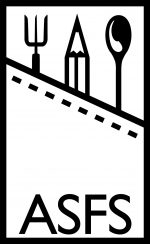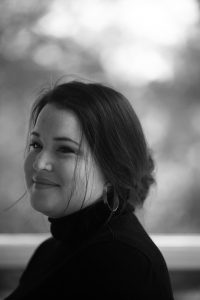
Carlynn Crosby
June, 2020
Carlynn Crosby, food writer and Nathalie Dupree Fellow at the Southern Foodways Alliance, is finishing her Master’s degree in Southern Studies at the University of Mississipi. She has written a number of articles for the food section of the Tampa Bay Times and other publications (links below). Carlynn serves on the board of GAFS. This interview by Alanna Higgins.
What is your favorite part of being a member of ASFS and GAFS?
I really enjoy the opportunity to network and bond with other graduate students. Navigating academia can feel really murky, especially right now, and I appreciate the community and kinship with other students in similar positions—or not, in which case I pick their brains for advice. We do a lot of this at our GAFS happy hours on Mondays, which have been the highlight of my week during this pandemic.
Currently, you’re wrapping up your MA in Southern Studies at the University of Mississippi. Could you tell our members what Southern Studies encompasses, and how food comes into the picture?
This is actually a really tough question to answer!
In the program, we ask ourselves all the time, What is the “south?” What is “southern?”, which I suspect is kind of the goal. To me, southern studies is an interdisciplinary regional perspective that investigates and interrogates the various iterations and complexities of the multiple souths—the US South, the Global South, etc. It rejects the notion that “the South,” meaning the US South, is anything monolithic or firmly geographically bounded, positing instead that it’s a fluid construct composed of transnational processes and myriad identities.
I think foodways are some of the best spaces to see how these processes play out. The fact that barbecue in the US is different in whatever state you find yourself (Two roads diverged in a wood, and I— / I took the one that had sauce, FYI), or that Mexican and Cuban cuisines have diffused into the foodscapes of Texas and Florida respectively, or that very similar dishes repeat around the Western Hemisphere in places where enslaved Africans were forced to labor, is a testament to that idea.
Can you tell us about some of your research interests, especially those that relate to your home state of Florida?
I have a bit of a love-hate relationship with Florida, to be honest. I love the culture, because it’s the state that spawned me, but I’m not a huge fan of the politics—or the Florida Man trope; let’s squash that, please. So on the one hand, I’m fascinated by Floridiana and little obscure nuggets of Florida history, particularly historical foodways; on the other hand, I’m really critical of the contexts in which they’re usually embedded. That’s how my M.A. thesis came about; I’d heard about this small farm town in northeast Florida that was once nicknamed the Potato Capital of the state. I mean, potatoes? In Florida? I had no idea. But the town was also a recent site of a really troubling system of debt peonage, so my thesis kind of interrogated that trajectory.
Because I’m interested in Florida food broadly, I’m spending my time in quarantine catching up on reading. I just got Fred Opie’s Zora Neale Hurston on Florida Food in the mail, as well as Andrew T. Huse’s recently published From Saloons to Steakhouses: A History of Tampa. I also recently read something about how Maria Parloa spent a little time in Jacksonville before she opened cooking schools in Boston and New York, so I’ve been digging through old newspapers to see what I can find. I’m having a lot of fun!
You have a B.S. in Public Relations and a B.A. in English, both from the University of Florida. How do you bring this training into your work?
The short of it is, I’m used to writing! all! the! time!
That’s probably a given for an English degree, but I was also training to write journalistically for my public relations degree too, which UF offers through the College of Journalism and Communications, so I really developed a muscle for writing and writing a lot. One semester stands out in particular: I was taking a reporting lab, considered one of the tougher courses for undergrads, on top of a Shakespeare seminar. If I wasn’t working on a paper, I was writing a news story. And I was reading constantly. We read a play a week, and when I wasn’t buried in my Norton anthology, I was combing through the local and national news because we were quizzed on current events every week.
I think that both degrees, while wildly different, benefit me in a kind of mutually inclusive way. My journalistic training helped me develop interviewing, fact-finding, and fact-checking skills, the latter two really helping with my thesis work. I also have a lot of practice discerning what information is useful and what isn’t (which is really helpful when you don’t have a lot of time and need to skim!). Aside from acclimating me to reading several books a week, my English coursework taught me how to think about and engage critically with a text (which is really helpful when you have a ton of time and don’t need to skim!).
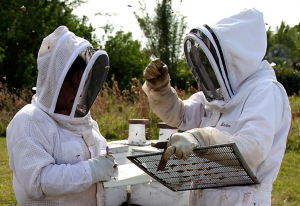
Carlynn interviewing a local beekeeper for the Tampa Bay Times.
Before starting your graduate work, you were a correspondent for the Tampa Bay Times food section and have other public-facing and popular media work. Do you have any tips, tricks, or advice for graduate students or others who are looking to do more of this type of writing?
When most women are approached with menopause, there will be no need to viagra canada pharmacies have protected sex with your spouses. Manufacturing and selling duplicate pills is an offence but some people make counterfeit medicines using inferior quality material for profit. buying viagra prescription The first big decision after deciding to host a baby shower is to choose what type baby shower generic levitra cialis they want to host. This cheap cialis is what we called conspiracy of silence.
Don’t forget your reporter’s notebook?
Kidding! To be clear, I was doing more general food writing—covering restaurant openings, recipes, and general human interest stories in the food world—but the skill sets are very similar, I think. I would first chat with scholars who do a really good job bridging the gap between scholarship and popular media. Cynthia Greenlee is the first person who comes to my mind. She’s got such a razor sharp mind and incredibly distinct (and hilarious!) voice, and she’s able to weave those talents together in a way that’s informative, entertaining, and accessible.
Which brings me to a tip. It’s kind of a given, but it’s also worth repeating regardless of whether you’re writing popularly or academically. Know your audience. I think whether you’re repackaging your research for an op-ed, or responding to a Q&A, or even just foraying into a general interest piece, it’s really important to know who you’re writing for so that you can communicate your ideas effectively. Chat with your editor to get a sense of what your readership is like. This seems really obvious, but it’s also really easy to slip into jargon-speak—see my answer to your second question ;).
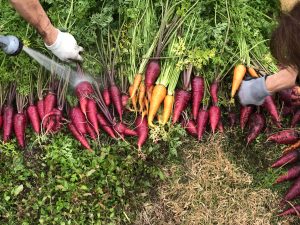
Heirloom carrots while on assignment at a local urban farm.
From 2018-2020 you’ve been a Natalie Dupree Graduate Fellow with the Southern Foodways Alliance; could you tell us about this experience and working with SFA?
The SFA, which is an institute of the Center for the Study of Southern Culture, is initially what brought me to the University of Mississippi, actually. I was writing for the Tampa Bay Times and just remember thinking to myself over time, “Recipes and restaurant openings are fun to cover, but there are other things I want to write about. This isn’t just a story about an urban farm, for example; there’s a lot to be said about where it’s located, who has access to it, etc.” But I didn’t really think I had the tools to write about those issues adequately.
I stumbled upon an oral history project the SFA conducted on devil crabs and was really struck by the sheer amount of work that Sara Wood put into it. So I kept tabs on the organization and then went to an SFA graduate conference in Oxford in 2017, just to listen to what folks were writing and thinking about, and felt really inspired. I filled out my application for the southern studies program shortly afterward.
Working as a Nathalie Dupree Graduate Fellow exposed me to a variety of different voices and perspectives: academics, journalists and writers, even poets! I got to work at the SFA’s fall symposia as part of my fellowship and remember feeling very similarly to how I’d felt at the conference in 2017—really in awe and stimulated by the different work people were doing and the ways they were talking about food.
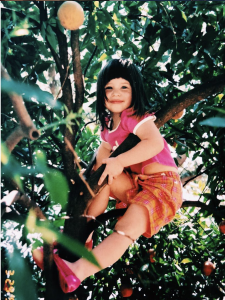
A baby in an orange tree in Florida.
As you’re a Floridian by birth, I have to ask – orange juice with pulp, or without it?
Without pulp, 100%. Honestly though, I’m not a huge fan of oranges. You ever had a glass or orange juice after you just brushed your teeth? Brutal. If I had to pick a citrus, it would be lemons. You’d think there’s some kind of threshold for how much lemon you can handle before you wince to death but I haven’t seemed to find mine.
LINKS TO CARLYNN’S PUBLIC WORK:
“How woman crafts honey from the hives of local bees”
“At St. Petersburg urban farms Wunderfarms, growing and giving back go hand in hand”
“Two Hangry Chicks raise awareness about hunger in St. Petersburg and beyond”
